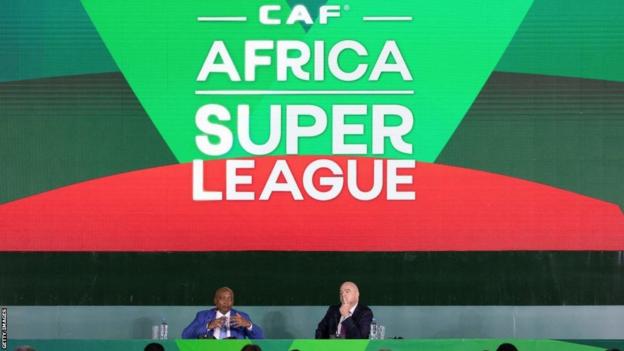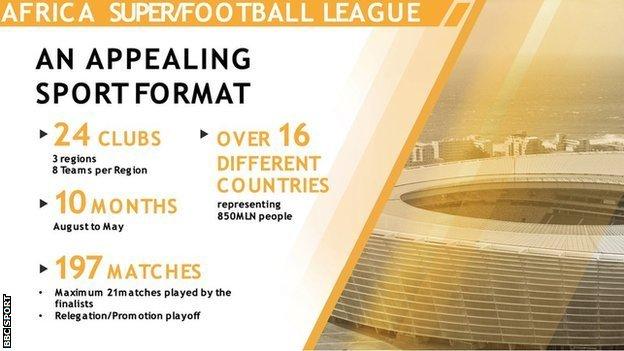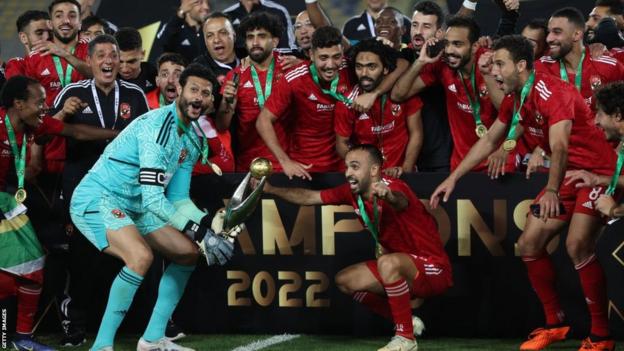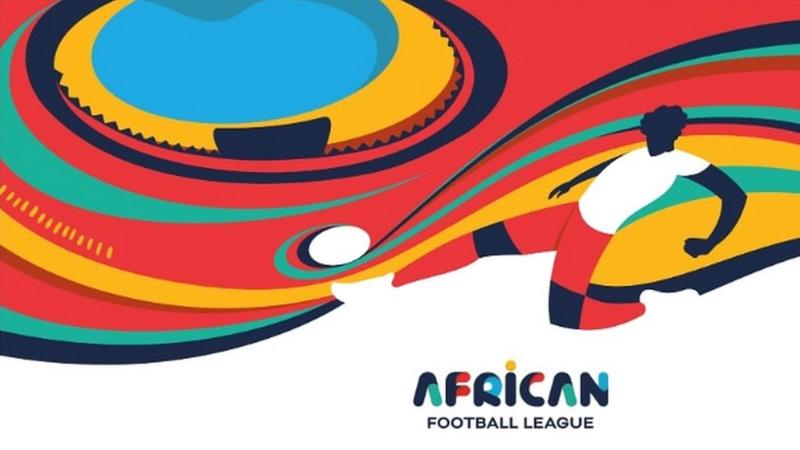Africa's new elite club competition, the African Football League (AFL), will kick off on Friday when the opening game takes place in Tanzania.
Before the strongest attempt yet to make African clubs competitive globally, BBC Sport Africa answers some of the key questions concerning the Fifa-backed tournament.
What - and when - is the African Football League?
The AFL is a new competition for the continent's leading clubs, eight of whom will battle it out in the hope of winning the $4m prize for the champions.
On Friday, the record 11-time African club champions - Al Ahly, of Egypt - meet Tanzania's Simba in the first of the quarter-finals, all of which are played over two legs.
The brainchild of Fifa and its president Gianni Infantino, who announced in February 2020 that the continent needed a new pan-African club competition, the AFL - in its own words - "is set to change the future of club football on the continent".
The two-legged final of this year's inaugural AFL, which will be played on a knock-out basis, is scheduled for 5 and 11 November.
Does Africa need a new club competition?
Back in 2020, Infantino outlined some of the weaknesses he saw in African club football, saying that the continent lacked "proper competition infrastructure" and existing tournaments such as the African Champions League and Confederations Cup were "30-40 times less successful than Europe".
With Fifa working in partnership with the Confederation of African Football (Caf), the hope is the AFL will not only raise the global profile of the continent's clubs but also generate increased revenue.
Should Africa's clubs resultantly improve their finances, the hope is that improved wages will incentivise more players to stay on the continent to play football without feeling the need to play in Europe or elsewhere.
"By providing an unparalleled competitive platform, the league aims to elevate the quality of the sport while generating substantial revenue streams," says the AFL, adding that the money will be shared "proportionally among the participating clubs and all stakeholders involved".

The original title of the competition - the Africa Super League - was eventually dropped because of associations with Europe's failed attempt to create a similar competition
Who are the participating clubs?
The eight teams have been selected from three different regions - north, central-west and south-east Africa - with Caf saying it chose the highest-ranked teams in each bloc.
In addition to Al Ahly, northern Africa - which has accounted for the winners in 11 of the last 13 stagings of the Caf Champions League - will be represented by Morocco's Wydad Casablanca, African champions in 1992, 2017 and 2022, and Esperance, whose tally of four continental crowns include back-to-back titles in 2018 and 2019.
As well as Simba, the south-east will incorporate Mamelodi Sundowns - one of only two sub-Saharan clubs to be crowned African champions since 2004 - and Petro Atletico, even though the Angolan club recently had to appeal a domestic ban over match-fixing charges the club denies.
With Nigeria's Enyimba having not contested the African Champions League semi-finals since 2011, the two-time African champions (2003, 2004) can count themselves lucky to be among the nominal top eight, which cannot be said of DR Congo's TP Mazembe, who won the last of their five titles in 2015.
And who are the 'stakeholders' involved?
The stakeholders are - in a perfect world - all the countries in Africa.
In a recent statement, the AFL said the money generated by the competition "will go to all 54 Caf members and local leagues to improve football development in those countries".
When the new elite league was launched in August 2022, it was suggested that each country would receive an annual $1m cash award, with the governing body itself hoping to earn about $50m which would be dedicated to youth and women's football.
However, such expectations have since been tempered by the tournament's reduced budget.
What happened to the hundreds of millions once linked to the AFL?

The AFL's format is very different to Caf's original ideas for the new tournament
Much of the talk before the prize money was finally confirmed suggested the AFL would bring in substantial revenue, with Caf president Patrice Motsepe speaking in August 2022 of a desire to bring in "$250-300m every year".
But those sums have not materialised, with the budget slashed from the initially suggested $200m - first mentioned by Infantino in 2020 - to $100m, which would have seen the competition winner earn $11.6m before being reduced even further.
There was once talk of 24 clubs each receiving $2.5m to participate in the competition, but the total AFL prize fund for the eight clubs currently stands at just over $10m.
On 30 September, Caf announced that the winner would receive $4m, the runners-up $3m, the semi-finalists $1.7m and the quarter-finalists $900,000 - all amounts greater than the rewards on offer in the African Champions League, which will continue.
Who is providing the money?
With seemingly unlimited funds, a fervent desire to promote their 2034 World Cup bid and a five-year partnership deal with Caf signed in May, it was little surprise when Saudi Arabia was unveiled as the AFL's main financial backer.
On 12 October, just weeks after hosting Caf's Super Cup match, Saudi Arabia's Visit Saudi - the public agency in charge of promoting tourism in the country - became the AFL's main sponsor.
"The success of the AFL will contribute to the building of youth academies for boys and girls and football infrastructure in [Caf's] 54 countries," the press release trumpeted.
On Tuesday, just three days before the official kick-off, the Rwandan government became another sponsor, with Visit Rwanda branding to be visible on player jerseys, in stadiums and elsewhere.
How can I watch?
The world's most successful football competitions, such as the Uefa Champions League and England's Premier League, make most of their money through lucrative broadcasting deals.
However, the first staging of the AFL will be unavailable through traditional platforms and will be streamed instead, either via the AFL website or its corresponding YouTube account, which had 706 subscribers two days before the tournament began.
Given the cost of data, many African football fans may choose against spending hard-earned income on the new competition but organisers are hoping for global interest. "With the right exposure, our players can be sold for double, triple or quadruple [their expected] value," one owner said.

Egypt's Al Ahly are the reigning African title-holders, having won the Champions League in 2023
Spectators can watch the games in the stadiums, with fans expected to pack in to Simba's Benjamin Mkapa Stadium for the opener.
What do critics say?
Not everyone is happy about the AFL, which organisers initially called the Africa Super League until being persuaded not to because of the potential negative associations with the swiftly-aborted European Super League.
Despite Fifa and Caf's combined attempts to bolster the quality of African clubs, who have struggled to make any regular impact at the soon-to-be-expanded Club World Cup, there are fears that the riches on offer may only widen the gap between Africa's elite clubs and the rest.
Club football is already dominated by clubs with superior budgets, most of which are found in North Africa. If they start receiving more money, how will the rest keep up?
"The Super League will kill African club football," said outspoken critic John Comitis, the owner of South Africa's Cape Town FC, speaking before the competition name change. "You can switch off the lights on domestic leagues."
What's the future for the AFL?
Both Fifa and Caf hope the inaugural AFL will go so well that the event attracts more sponsors and broadcasters ahead of the second edition next year, which could be a totally different proposition.
On its website, the AFL says it is "anticipating remarkable growth" and expects to include 22 teams next year in an extended format throughout the season, providing "greater inclusivity of clubs from across the continent".
Former Simba chief executive Barbara Gonzalez is among those who simply hope the tournament can raise the quality of African football and increase the investment required to lead to international success. "Now that they're investing heavily [in the African club game], we have a fighting chance," she said.
Source: BBC Africa

